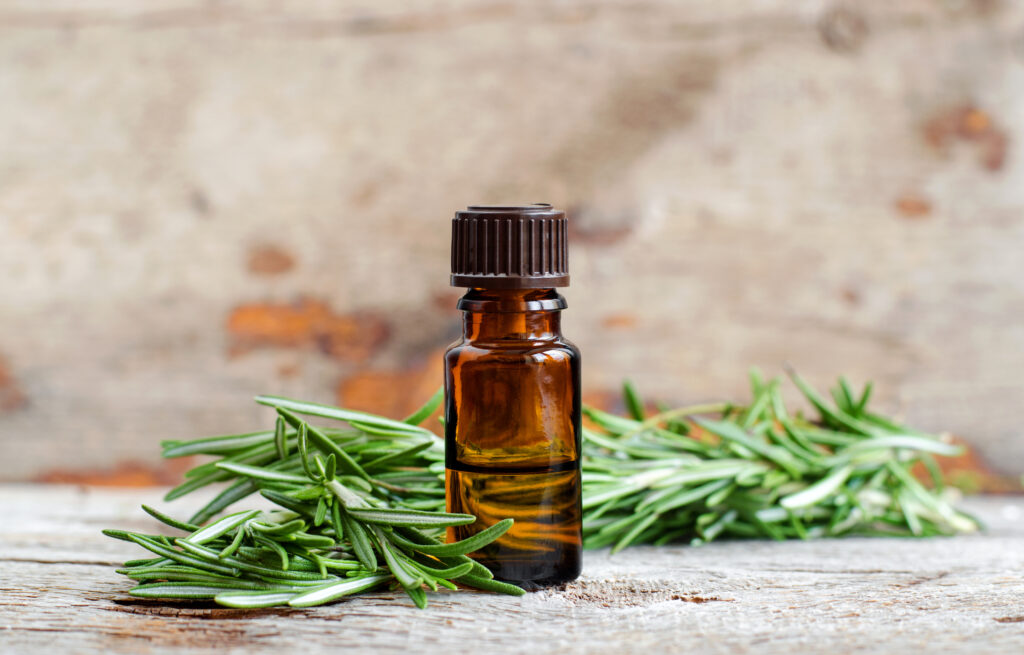Rosemary isn’t just for garnishing your Sunday roast! There’s more to this herb than you may think…
Let’s look at how this easy-to-grow herb can be beneficial for both mind and body –

Rosemary is a shrub (Rosmarinus officinalis) from the Lamiaceae family along with thyme and sage and is a popular ingredient in Mediterranean dishes.
The needle-like leaves can be used fresh or dried in cooking and different parts of the plant can be made into a tincture, extract, or essential oil for more potent effects.
What are the beneficial properties of rosemary?
The plant, including its flowers, is full of health-giving compounds which can be extracted and used medicinally: carnosol, carnosic acid, rosmarinic acid, terpenes, cineole, eucalyptol, camphor, and pinenes are just a few of them.
- Antibacterial – compounds such as carnosic acid and rosmarinic acid provide anti-microbial properties against a number of bacteria and yeasts such as E.Coli, Staphylococcus mutans, Salmonella, Clostridium perfringens, and Fusobacterium. 1https://www.ncbi.nlm.nih.gov/pmc/articles/PMC6165352/ 2https://www.tandfonline.com/doi/full/10.1080/10715760500473834?src=recsys Rosemary is so effective at inhibiting the growth of pathogenic bacteria, that it’s used in food manufacturing, particularly meat processing, as an antimicrobial agent. 3https://www.ncbi.nlm.nih.gov/pmc/articles/PMC6165352/
- Antioxidant (mop up free radicals) – both carnosol and carnosic acid have antioxidant effects. 4https://www.tandfonline.com/doi/full/10.1080/10715760500473834?src=recsys5https://www.tandfonline.com/doi/abs/10.3109/00498259209046624?src=recsys 6https://www.ncbi.nlm.nih.gov/pmc/articles/PMC4749867/
- Antiangiogenic – carnosic acid and carnosol lower the risk of neurodegenerative disease. 7https://pubmed.ncbi.nlm.nih.gov/22232247/
- Antifungal – cineole, eucalyptol, camphor, and pinene inhibit the growth of candida and other yeasts. 8https://www.tandfonline.com/doi/abs/10.1080/19440049.2019.1678771?journalCode=tfac20 9https://www.nature.com/articles/s41598-022-19425-9
- Antithrombotic: compounds such as rosmarinic acid inhibit platelets in the blood that form clots. 10https://pubmed.ncbi.nlm.nih.gov/15850964/
How can rosemary support your health?
Memory: diterpenes in rosemary essential oil enter the bloodstream by the lung or nasal mucosa, cross the blood-brain barrier and have a positive effect on brain function. 11https://www.ncbi.nlm.nih.gov/pubmed/20377818 In a short-term study, just half a teaspoon of dried rosemary improved processing speed and memory (a useful predictor of cognitive function during aging). 12https://pubmed.ncbi.nlm.nih.gov/21877951/
Concentration and mental accuracy:1,8-cineole has been shown to improve cognitive performance. 13https://pubmed.ncbi.nlm.nih.gov/23983963/
Mood and stress – Rosemary has been shown to improve mood and reduce stress due to its neuroprotective properties: “Smelling lavender and rosemary increases free radical scavenging activity and decreases cortisol levels in saliva”. 14https://pubmed.ncbi.nlm.nih.gov/17291597/
Immune system – the antioxidants in rosemary extract reduce inflammation and also have anti-viral effects. 15https://www.ncbi.nlm.nih.gov/pmc/articles/PMC7286877
Oral health: Rosemary has also been shown to inhibit Candida albicans, Enterococcus faecalis, Streptococcus mutans, and Pseudomonas aeruginosa. Research indicates that it is a promising therapeutic agent that can be added to some medical and dental formulations such as toothpaste, mouthwashes, irrigating root canals, ointments, and soaps, in order to control pathogenic microorganisms and biofilms. 16https://pubmed.ncbi.nlm.nih.gov/28093936/
Skin health: Rosemary oil is noted for its anti-inflammatory, stimulating, and analgesic properties, making it perfect for relieving redness in the skin. 17https://www.healthline.com/health/essential-oils-for-skin Our Soothing Lotion and Soap contains rosemary essential oil, probiotic kefir, and goat’s milk. We recommend this range for rosacea and skin rashes. The rosemary essential oil in our Soothing Goats Milk Soap is also beneficial for dry and itchy scalps, as well as for age spots, wrinkles, and lines.
Ideas for adding rosemary to everyday dishes
- Mix chopped fresh rosemary with some oil and a pinch of salt and rub into the skin of sweet potato or celeriac wedges.
- Add it to meat dishes to give a pungent flavour.
- Add rosemary to tomato-based sauces along with oregano and thyme for a Mediterranean taste.
- Brew a cup of rosemary tea using one TSP of chopped fresh herbs steeped for a few minutes in 200ml of boiling water.
- Talking of tea, our Get Me Through the Day Tea is great for fatigue and low mood – it contains vervain, rosemary, peppermint, and mugwort.
Nutrient content:
As well as all the above essential oils and phenolic compounds, fresh rosemary is a good source of B vitamins, and vitamins A and C as well as minerals such as potassium, calcium, iron, manganese, copper, and magnesium.
Who should be cautious about consuming Rosemary?
We recommend adding small amounts of fresh or dried rosemary to everyday meals.
Only use rosemary in the form of a tincture, extract, or as essential oil under the advice of a qualified practitioner.
The following groups should be cautious of taking concentrated doses of rosemary:
- Pregnant women
- People with kidney conditions
- People taking medication including blood thinners, blood pressure medication, lithium and diuretics.
Before taking new supplements, always check with your GP or consultant regarding interactions with medications and/or health conditions.
For further info on herbs and spices that do more than just flavour your food, check out Ginger – the fiery spice.
Feel free to contact one of our Nutritional Therapists via live chat from 8 am to 8 pm on weekdays for bespoke advice on gut wellness.
References
- 1
- 2
- 3
- 4
- 5
- 6
- 7
- 8
- 9
- 10
- 11
- 12
- 13
- 14
- 15
- 16
- 17

















